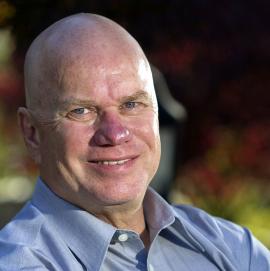 It’s Wednesday! Happy Thanksgiving, U.S. readers! Hope you have a wonderful break. StrictlyVC won’t be publishing over the next two days but we have some great things lined up for next week, so stay tuned and we’ll see you then!
It’s Wednesday! Happy Thanksgiving, U.S. readers! Hope you have a wonderful break. StrictlyVC won’t be publishing over the next two days but we have some great things lined up for next week, so stay tuned and we’ll see you then!
—–
Top News in the A.M.
Be warned: East Coast airports are already experiencing delays, with heavy precipitation, combined with the crush of passengers, gumming up the works.
—–
FirstMark Capital: Health Care Investor?
FirstMark Capital, the early-stage, New York-based venture firm, is best-known for its consumer investments, including Pinterest, the mega-successful online bulletin-board network whose newest, $225 round of funding valued the company at $3.8 billion. (FirstMark participated in its $500,000 seed fund in early 2010.)
Lesser known is FirstMark’s newer, self-imposed mandate to fund more healthcare IT companies, which its partners view as a giant opportunity that happens to be highly complementary to the firm’s existing skill set.
Not only is the health care IT market “gigantic” and the “cost curves unsustainable,” as managing director Amish Jani recently noted to me, but thanks to numerous trends — like cloud platforms that connect practitioners and patients in new ways — it has also become accessible to investors who might not have PhDs but who know their way around platform technologies.
For example, FirstMark has backed Gravie, a consumer marketplace for healthcare insurance; Greenphire, a company that makes Web-based payment software that’s marketed to the clinical trial industry; and Superior Access Insurance Services, an online insurance exchange that’s used to connect carriers with insurance agents.
Its investment in BioDigital is another example of a health care company that FirstMark seems well-suited to help. The 11-year-old medical visualization firm already develops 3D animations of the human anatomy for drug makers and medical device makers; with the help of FirstMark — which led a $4 million Series A round for the company in September — BioDigital is working toward new, freemium models, too, including with consumer Web companies that want to augment their content with its technology.
Still, not everyone thinks the strategy of FirstMark — or other Internet investors like Social+Capital Partnership that are suddenly focusing more on healthcare IT — makes sense. Bijan Salehizadeh, for one, a longtime PhD and managing director at NaviMed Capital in Washington, D.C., recently wrote a thoughtful piece about how easy it is to underestimate the complexities of healthcare investing, not least because healthcare is a “slow-to-evolve industry with powerful and durable relationships.”
Domain expertise matters, Salehizadeh had argued.
Maybe so. Then again, the right health care investment could reframe the way that FirstMark is viewed by entrepreneurs and investors alike. As Pinterest illustrates, sometimes it takes just one savvy bet to change everything.
New Fundings
Athos, an 18-month old, Redwood City, Calif.-based wearable technology company, has raised $3.5 million in seed funding from Social+Capital Partnership. Athos’s technology can track muscle groups, heart rate, and breathing levels, among other things. TechCrunch has an overview of the company and its background story here.
Beyond the Rack, a four-year-old, Montreal-based private online shopping club that features steeply discounted designer fashions and accessories, has raised a $25 million round led by Investissement Québec, Iris Capital and Tandem Expansion Fund. Previous investors Highland Capital Partners, Panorama Capital, BDC Venture Capital IT Fund and iNovia Capital also contributed to the funding, which brings the company’s total capital raised to just more than $70 million.
DraftKings, a nearly two-year-old, Boston-based daily fantasy sports operator, has raised $24 million in Series B funding. Redpoint Ventures led the round, with participation by GGV Capital, Atlas Venture, and BDS Ventures. The company has reportedly raised $34.5 million so far.
Extreme Reality, an eight-year-old, Herzelia, Israel- based company whose software enables full-body, 3D motion control on any device via a standard 2D camera, has raised a new, $10 million round of funding. The money comes from previous investor Marker and another source that the company is declining to name. Extreme Reality has raised at least $24 million to date, according to Crunchbase.
Gridco, a three-year-old, Woburn, Mass.-based company, has raised a fresh $10 million in funding led by Kleiner Perkins Caufield & Byers, judging by a new SEC filing. Previous investors North Bridge Venture Partners, Lux Capital, and General Catalyst Partners also appear on the filing. Gridco, founded by Sycamore Network founder Naimish Patel, is working on smart grid power management technologies.
Lock8, an 18-month-old, “smart” bike lock maker with offices in London in Berlin, has raised an undisclosed amount of “seven-figure” funding from Horizons Ventures and Otto Capital.
Mouth Foods, a three-year-old, Brooklyn, N.Y-based online platform that helps makers of “artisan” foods sell to customers, has raised $1.5 million in Series A funding led by Vocap Ventures. Other participants in the funding included VegasTechFund and angel investors Joanne Wilson and Jason Calacanis. (“It’s about the art of the food,” Mouth founder Craig Kanarick told the WSJ yesterday. “We don’t sell things like carrots and milk.”)
New Seasons Market, a 14-year-old chain of privately owned grocery stores operating in Oregon and Washington, has raised $17.6 million in equity, according to a new SEC filing. Among the non-executive directors listed on the filing is Caryn Ellison, a former CFO of Crocs Inc.; Theresa Marquez, long the chief marketing exec at Organic Valley foods; and Stan Amy of New Villages Group, a Portland-based investment firm that targets “sustainable investments and communities.”
Supersolid, a nearly two-year-old, London-based mobile games studio, has raised an undisclosed amount of funding from Index Ventures and Intel Capital. The company’s first game, “Super Penguins,” has been downloaded by more than 10 million people, according to the company.
Wire Labs, a 10-month-old, Seattle-based company behind a new mobile messaging application, has raised $1.8 million in seed funding from numerous angel investors. Among them: Zillow CEO Spencer Rascoff; Paul Allen of Vulcan Capital, former Expedia CEO Erik Blachford; and former Facebook executive Owen Van Natta. Earlier this year, the company, founded by a former pair of Amazon engineers, had announced a separate round of $150,000 in seed funding.
—–
New Funds
Artis Ventures, a 12-year-old, San Francisco-based hedge fund, is raising a new $15 million venture-focused fund titled Artis Ventures II, L.P., according to a new SEC filing that lists only firm cofounder Stuart Peterson. Artis has a wide-ranging portfolio, from the well-funded electronic medical record platform Practice Fusion, to the cloud and storage startup Nimble Storage (which filed to go public last month), to the smart grid concern Silver Spring Networks. (Silver Spring went public in March. Its shares were offered at $17; today, they’re trading at $20.)
Blade, a new, Boston-based “startup foundry” has raised almost $20 million from undisclosed funding sources, according to Bloomberg. Paul English, the co-founder and chief technology officer of Kayak Software (sold to Priceline.com in May for roughly $1.8 billion) is managing the fund. English plans to invest an average of $2 million across 10 startups to help them get off the ground and, eventually, to “make an obscene amount of money for investors.”
—–
People
Venture capitalist Brad Feld astutely observes that: “Sometimes you have to stop doing things to make more progress.”
Malaysian billionaire Vincent Tan is looking to take his 14-year-old online payments company, MOL Global Pte, public in a dual listing on Kuala Lumpur’s stock exchange and either Hong Kong or Singapore, reports Bloomberg. In 2009, MOL Global acquired the social networking site Friendster.
—–
Exits
dLoop, a two-year-old, Bay Area startup whose content management system promises better analysis and data classification, has been acquired by the online data storage company Box. Terms of the deal were not disclosed, though dLoop doesn’t appear to have raised outside funding. Techcrunch analyzes the deal here.
Seesaw, a year-old, San Francisco-based mobile developer that had been formed by the founders of CoTweet, has been acquired by the San Francisco-based startup Byliner, a digital publisher. Seesaw never disclosed how much seed funding it had raised though it had backing from Freestyle Capital, Baseline Ventures, First Round Capital and Betaworks. The financial terms of its acquisition aren’t being disclosed, either.
—–
Job Listings
Morgan Stanley‘s two-year-old, late-stage-investing arm, Expansion Capital, is looking for an analyst to help it evaluate opportunities to invest in healthcare, digital media, and consumer companies that are mostly based in North America. The unit invests between $5 million and $15 million per transaction, which can be a first institutional financing, a follow-on financing, a carve-out, or a secondary transaction. To apply for the San Francisco-based job, you’ll need a stellar academic record and at least one year of experience at a leading investment bank.
—–
Essential Reads
Target (yes, that Target) is planning to open an accelerator in Bangalore to compete with Amazon and Walmart, which are themselves busily trying to twist their flag poles in the ground.
Lost in the Game: What is it that has made the first-person shooter such a success?
French conglomerate Vivendi is spinning off its mobile and Internet unit as early as next year.
—–
Detours
New York Magazine has a fantastic piece on Jordan Belfort, who ran the penny-stock boiler room Stratton Oakmont on Long Island until he was arrested by the FBI in 1998. (Leonardo DiCaprio is starring as Belfort in the upcoming film, “The Wolf of Wall Street.”) Belfort, now 51, tells the magazine of his two years and four months in prison: “I was shocked. Everyone’s playing tennis and basketball. The Latins have their music blasting. I was like, Wow, this isn’t so bad.”
During the Cold War, Berlin was one of the most spy-ridden cities in the world. Now it’s the place to go to escape government surveillance.
At your slurvice: Where to drink in London this holiday season.
Examining the perfect joke.
—–
Retail Therapy
Win-win: Buy one of these indestructible One World Futbols and a child in a disadvantaged community will receive one, too.
These Kano do-it-yourself computer kits are super smart. (The company was co-founded by Index Ventures partner Saul Klein.) Unfortunately, if you haven’t ordered one yet for the budding geek in your family, you’re a little late for the holidays; new kits won’t be available to ship until June.
Beer-flavored cigars. To smoke with your beer. Because that wouldn’t be overdoing things at all.
—–
Please feel free to send us any and all story suggestions (anonymous or otherwise) by clicking here. If you’re interested in advertising in our email newsletter, please click here. To sign up for the newsletter, visit strictlyvc.com.





























